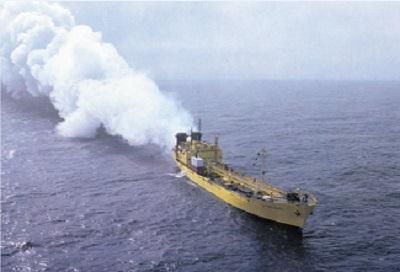Special and Research Permits for Ocean Dumping
Special Permits
EPA may issue a special permit under the Marine Protection, Research and Sanctuaries Act (MPRSA) to an applicant seeking to dispose of materials in the ocean when the proposed disposal satisfies EPA’s ocean dumping criteria. Special permits may be issued for a term not to exceed three years.
Ocean Disposal Sites for Special Permits
Through rulemaking, EPA designates ocean disposal sites for materials to be disposed under a special permit. Ocean disposal sites are precise geographic areas within which ocean dumping is permitted subject to specific conditions of an individual MPRSA special permit. Site designations are based on environmental studies of the proposed disposal site and regions adjacent to the site, and on historical knowledge of the impact of waste disposal on areas similar to such sites in physical, chemical and biological characteristics. Learn more about the disposal site designation process.
Examples of Special Permits
In the 1970s and 1980s, EPA issued MPRSA special permits (and designated sites) for ocean disposal of industrial wastes, sewage sludge and other materials. The Ocean Dumping Ban Act of 1988 amended the MPRSA and, among other things, prohibited the ocean dumping of sewage sludge and industrial waste. As a consequence, EPA now rarely has occasion to issue special permits.
EPA has issued MPRSA special permits for disposal of fish processing waste in ocean waters off American Samoa. For the fish processing waste disposal, EPA also designated an ocean disposal site off American Samoa. Disposal at this site is limited to the dissolved air flotation (DAF) sludge, presswater and precooker water produced from fish processing operations at fish canneries in American Samoa authorized by the MPRSA permits. The American Samoa fish processing waste ocean disposal site is the only currently designated site for the disposal of materials other than dredged material.
Research Permits
EPA may issue research permits for the dumping of materials into the ocean as part of a research project when it is determined that the scientific merit of the proposed project outweighs the potential environmental or other damage that may result from dumping. Research permits cannot be issued for dumping of materials specified in 40 CFR 227.5 (prohibited materials) or for any of the materials listed in 40 CFR 227.6 (prohibited constituents except as trace contaminants), unless subject to the exclusion of 40 CFR 227.6(g). Research permits may be issued for up to 18 months.
Ocean Dumping Sites for Research Permits
 Incineration at sea.
Incineration at sea.
Dumping sites are for materials disposed at sea under a research permit are identified in the permit and depend on the nature of the proposed study. EPA considers the general and specific ocean dumping criteria (40 CFR 228.5 and 228.6) when evaluating alternative sites and selecting a preferred site in order to minimizes any potential adverse impacts to the marine environment.
Examples of Research Permits
Between 1974 and 1982, EPA issued research permits under the MPRSA for incineration-at-sea to evaluate the efficiencies of special ship board incinerators for destroying liquid hazardous wastes. Since that time, MPRSA amendments have prohibited the ocean dumping of industrial wastes.
